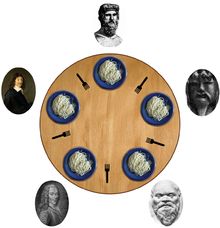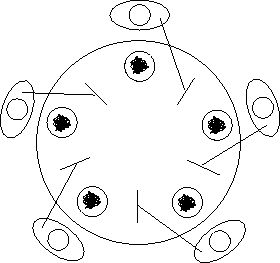The Dining Philosophers
, Speed It Up!, that presented this problem to the world. It was Tony Hoare, however, who gave the problem it's more official formulation.
In the Dining Philosophers problem, we encounter five famous philosophers sitting at a round table eating from bowls of spaghetti. Between each of these bowls, there are five forks that the philosophers can use to eat their food with. For some strange reason however, these philosophers decide that they each require two of the five forks in order to eat their food.
Each of these philosophers, however, could be either in eating or thinking state, and whenever they choose to dive into the food in front of them, they must first obtain both the left and the right fork. However, when a philosopher takes a fork, they have to wait till they have eaten before they can relinquish said fork.
This method of eating presents a problem when each of the five philosophers manages to pick up their left fork at the same time.

In the preceding diagram, we see just such a situation arise. Each of the five philosophers has picked up the left fork and is now sitting thinking until such time as the right fork is available. Since every philosopher will never relinquish their fork until they have eaten, the dinner table has reached a deadlocked state, and will never go further.
This problem illustrates a key issue we may run into when we are designing our own concurrent systems that rely on key synchronization primitives (locks) in order to function correctly. Our forks, in this example, are our system resources, and each philosopher represents a competing process.

